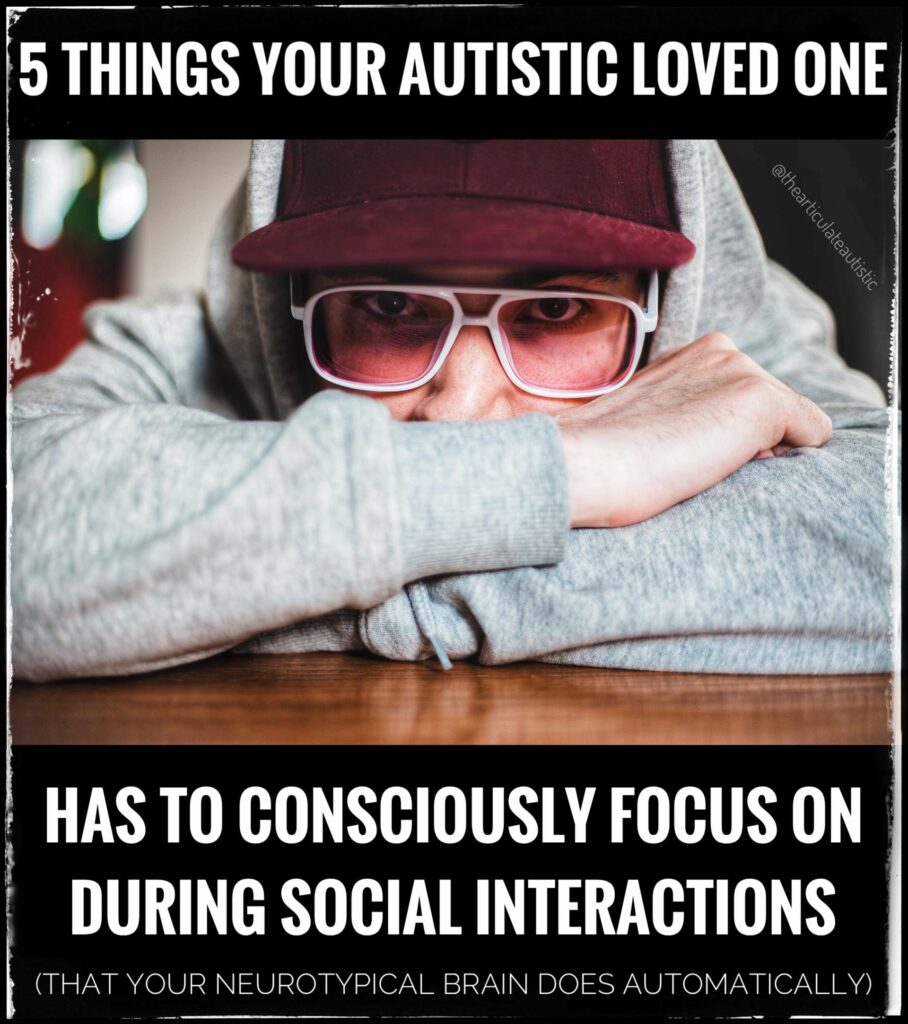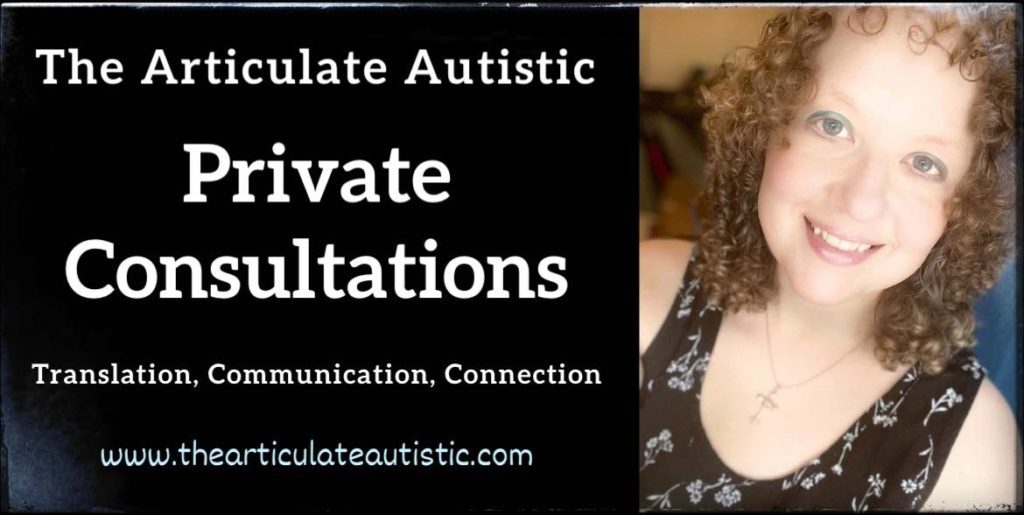5 Things Your Autistic Loved One Has to Consciously Focus On During Social Interactions (That Your Neurotypical Brain Does Automatically)

“He’s such a jerk. He just ignores me!” “She’s so rude. She won’t even smile!”
Did you know that what you’re interpreting as rude behavior in your autistic loved one may actually be the effects of a brain that needs to manually focus on things a neurotypical brain does automatically?
Socializing as an autistic person is very different from socializing as a neurotypical person, and you’ll see why when you learn just how much mental labor an autistic person has to exert that you, as a neurotypical person, never even have to think about.
- Moving our bodies without tripping, bumping someone, or knocking something over.
A combination of poor proprioception (an instinctual knowledge of where your body ends and other objects begin), dyspraxia (poor coordination and balance), fine and gross motor struggles, poor muscle tone, and/or hypermobility can make something as seemingly-mundane as walking through someone else’s living room to their bathroom feel like a minefield of potential disaster for your autistic loved one.
As a neurotypical person, your brain and body automatically adjust where you put your feet and limbs as you navigate through a space. You don’t have to think about it, you just do it! That’s why having a conversation while carrying an object, a pet, or a baby down a flight of stairs is as automatic (and easy) as breathing for you.
Not so for many of us.
This is why you may notice your autistic loved one going quiet while moving through a space (especially an unfamiliar one) and being very intentional about how and where they put their limbs. This is why they may also appear to have a flat vocal tone, an intense gaze, and a facial expression that translates as angry (when what’s really happening is they’re using a lot of mental energy to stay focused on getting where they need to go without tripping, bumping someone, or knocking something over).
Trying to talk to an autistic person who struggles with coordination while they’re navigating a space can result in them snapping at you because if they lose focus, they know they’re likely to do at least minor damage to themselves or someone’s property.
In my case, I’d rather be perceived as rude than have to try to justify why I just knocked over a vase that’s been in someone’s family since the 1800s, or why I fell headlong down a flight of stairs because someone asked me a question mid-step.
- Animating our faces to produce a facial expression that corresponds with the mood/tone of the social situation.
As a neurotypical person, when you feel an emotion, the corresponding facial expression automatically appears across your features. You don’t have to think about it. In fact, it probably annoys you that you can’t hide what you’re thinking and feeling at more embarrassing and trying moments in your life.
Many autistic people, however, have the exact opposite problem. We feel a wide range of emotions like our neurotypical counterparts, but the corresponding facial expression doesn’t appear!*
And, for us late-diagnosed folks, many of us have lived decades without even realizing our faces appear blank to others.
I was 32 years old when I was in a conversation with my aunt about my childhood, and I told her that my primary emotions, back then, were confusion and fear. She said she didn’t know that, and I was shocked. I asked her, “Well, couldn’t you tell by my facial expressions?” She just blinked at me and said; “You didn’t make facial expressions as a kid.”
I felt like I’d been slammed in the stomach with a wrecking ball. It was then and only then that I was made aware that not only could I not read other people’s facial expressions and body language, I was apparently not showing any emotions on my face or in my body language, either!
In social situations, I have to manually move my facial muscles into what I believe is the correct corresponding expression so many times throughout an interaction. So much of my energy and focus goes into ensuring my facial expressions look “correct” (according to societal standards) that I often miss what’s being said to me.
Furthermore, I usually don’t remember interactions because I’m so focused on performing interested and attentive that I can’t actually be interested and attentive!
This may be what’s happening with your autistic loved one, as well.
* Some autistic people will make facial expressions that correspond to their internal feelings, but they may not match the given social situation.
- Blocking out each individual piece of background noise to focus on a task/social interaction.
Another thing many autistic people have to manually focus on that the neurotypical brain does automatically is filtering out background noise.
When a neurotypical person is sitting across from someone in a restaurant, having a conversation, their brains automatically focus on the other person, with the rest of the noise falling into the background–again, automatically.
For many autistic people, however, sitting across from someone in a restaurant and trying to have a successful conversation can be exhausting because we have to manually force our brains to focus on the conversation while also consciously filtering out every other sound that’s coming through at equal or higher volume.
For neurotypical people, a fire alarm or a screaming child in the next booth may cause significant concentration problems and distress, but for many autistic people, utensils clinking on dinnerware four tables away can cause the same amount of distress.
If your autistic loved one asks you to repeat yourself often when in public or uses noise-canceling headphones, even in environments where you, as a neurotypical person, register a low level of noise, this is likely why.
- Modulating our tone of voice by adding inflection and cadence while also being mindful of how loudly or softly we speak.
Another thing that can make socializing with neurotypical people difficult for autistic people is that we have to manually modulate our vocal tone so as not to have our natural monotone mistaken for rudeness, disinterest, annoyance, etc.
Just like with facial expressions, when neurotypical people feel an emotion, that emotion reflects in their voices automatically with little conscious effort. Having natural cadence and inflection in one’s voice means being able to be more fully present and mindful during social interactions because it happens automatically.
The next time you’re speaking with the autistic person in your life, remember they are probably putting a great deal of energy into masking their natural tone and volume so as not to offend you.
If something they say sounds “off” for a moment or two, be aware of just how much effort they’re putting into masking just to be able to interact without upsetting you, and give them grace. Don’t point out that one little thing you noticed or let your mind spiral into suspicious thoughts about their intentions. It’s that kind of thinking from neurotypical people that can make autistic people give up socializing entirely.
- Remembering what we are going to say when we’re finally able to share our thoughts in a group conversation.
When neurotypical people converse with one another, there’s a natural social rhythm they’re attuned to that gives them unspoken cues to either speak or listen, depending on the conversation, the setting, and the perceived social hierarchy of the group members.
Autistic people also have our own natural social rhythm when speaking with others of our neurotype. It’s when we try to engage across neurotypes that things can get tricky.
This is what’s referred to as the ‘double empathy problem’.
Excerpt from the article published by the National Autistic Society:
“[T]he ‘double empathy problem’ refers to a breakdown in mutual understanding (that can happen between any two people) and hence a problem for both parties to contend with, yet more likely to occur when people of very differing dispositions attempt to interact. Within the context of exchanges between autistic and non-autistic people however, the locus of the problem has traditionally been seen to reside in the brain of the autistic person. This results in autism being primarily framed in terms of a social communication disorder, rather than interaction between autistic and non-autistic people as a primarily mutual and interpersonal issue.”
When an autistic person is in a group full of neurotypical people, it can take a lot longer for us to interject our thoughts on the right “beat”. Therefore, we may spend so much mental energy watching others for cues while simultaneously maneuvering our bodies so as not to bump into others, and manually focusing on our facial expressions, vocal tone, and body language, that hanging onto the thought we wanted to contribute can feel like the mental equivalent of trying to hang onto a buttered eel.
If your autistic loved one blurts out information or circles back to a topic that other speakers have already moved past, this isn’t a purposeful attempt to hijack the conversation; they just want to contribute, and with all the mental effort focused on masking, they missed their chance!
The Takeaway
What neurotypical brains do automatically, many autistic people have to manually and consciously focus on doing. Furthermore, when it comes to facial expressions, vocal tone, cadence, and saying the “right” thing, that’s autistic masking, and it’s not good for our mental health.
In an ideal world, autistic people would have to spend far less time performing like a neurotypical person but not truly connecting in social situations and more time being an autistic person who makes authentic connections with people who see the true value and beauty of unmasked neurodivergence.
Download PDF of this article on Patreon.
Need some personalized help? I now offer private consultations!






Correct! And that is why some people at work dislike me for my ‘personality’ or ‘communication style’ and are mean and bully me there.